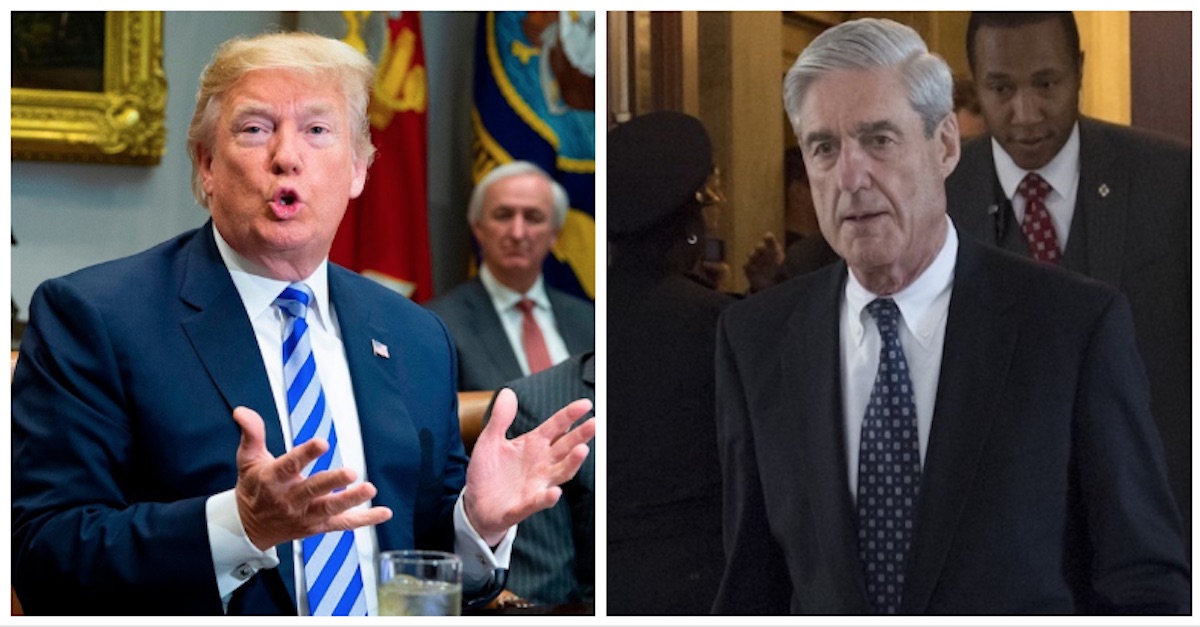
Democrats on the House Judiciary Committee told the U.S. Supreme Court they want another opportunity to impeach President Donald Trump. And they plan to use onetime special counsel Robert Mueller’s secret grand jury materials to make their final decision.
In a reply brief filed Monday, lawyers for the Judiciary Committee argued against the U.S. Department of Justice’s (DOJ) bid to have those materials subjected to a long-term stay pending the ultimate resolution of the case. Attorney General Bill Barr hopes the high court hears and reverses lower court orders to release those documents; Democrats would rather they don’t take the case at all.
“[The Judiciary] Committee and the public continue to suffer grave and irreparable injury each additional day the district court’s order is prevented from going into effect: the Committee is being deprived of the information it needs to exercise its weighty constitutional responsibility,” Democrats argued in opposition to the would-be stay.
Their filing notes that time is an extremely important consideration:
If DOJ’s request for a stay is granted, DOJ need not file its certiorari petition until August 2020, and therefore [the Supreme Court] likely would not determine whether to grant or deny that petition until at least October 2020. This substantial delay will seriously endanger the [Judiciary] Committee’s ability to complete its impeachment investigation during the current Congress— which ends not long thereafter on January 3, 2021.
The legal battle over whether congressional investigators are entitled to those materials mostly hinges upon one disputed phrase.
At issue is whether or not the House’s still-ongoing impeachment inquiry qualifies as a “judicial proceeding” under the Federal Rules of Criminal Procedure. Democrats have consistently maintained–and lower courts have agreed–that an impeachment qualifies as such a proceeding. The DOJ under Trump used to feel the same way–but self-admittedly “evolved” away from that perspective in 2019.
The motion also took the federal government to task for somewhat conveniently abandoning their own previous definition.
“[T]he decision [by the lower court] was plainly correct to reject the newly developed position that DOJ has advocated here, after decades of taking the opposite view that Congress can indeed legally obtain grand-jury materials in connection with impeachment proceedings,” the attorneys note in the 33-page filing.
The effort to obtain the full and unredacted Mueller report has been legally justified by the specter of a second, full-blown impeachment inquiry in various court briefs and oral arguments over the past several months and Democrats did not shy away from that argument in their latest filing; if the redactions support an additional round of formal impeachment hearings, the various committee chairs will follow the evidence and take the plunge, they say.
RELATED: House Democrats Want to Use Mueller Grand Jury Materials for Trump’s Impeachment Trial
“The Attorney General released a redacted version of the report to Congress and to the public in April 2019,” the filing continues. “That version of the Mueller Report contains numerous redactions, including redactions made under Federal Rule of Criminal Procedure 6(e) to protect the secrecy of grand-jury material. These redactions bear on whether the President committed impeachable offenses by obstructing the FBI’s and Special Counsel’s investigation into Russian interference in the 2016 election and his possible motivations for doing so.”
Litigation began after DOJ denied a congressional request for the unredacted version of the Mueller report over a year ago.
In October 2019, U.S. District Judge Beryl A. Howell issued a scathing ruling which termed the Trump administration’s legal arguments a “farce” and serially insulted the attorneys for their logic and recent vintage volte-face on what “judicial proceeding” means.
“DOJ relies on the definition [of “judicial proceeding”] first articulated by Judge Learned Hand in 1958,” she writes in a footnote on page 22 of the decision. “DOJ’s reliance on this definition is puzzling since courts—including the D.C. Circuit—have consistently recognized that Judge Hand gave ‘judicial proceeding’ ‘a broad interpretation.’”
Barr and his underlings have consistently maintained that DOJ will be “irreparably harmed” if those materials are released to the U.S. Congress–essentially saying there’s no amount of money damages that can reverse or cure the release of the full report.
But like the district court before, the U.S. Court of Appeals for the D.C. Circuit was unmoved by the Trump administration’s attempts to justify continued secrecy over the redacted report and footnotes.
“The constitutional text confirms that a Senate impeachment trial is a judicial proceeding,” Circuit Judge Judith Rogers determined in March of this year. “The term ‘judicial proceeding’ has long and repeatedly been interpreted broadly.”
From there, it was an easy call for the courts to force DOJ’s hand.
“Courts must take care not to second-guess the manner in which the House plans to proceed with its impeachment investigation,” Rogers noted. “The Committee states that it needs the unredacted material.”
The Supreme Court is the White House’s last hope in the months-old courtroom tug-of-war–but the nine justices have yet to determine whether or not the issue needs their collective imprimatur.
Earlier this month, Chief Justice John Roberts okayed a DOJ request for a brief hold but the move was likely not a portent for any eventual outcome as House Democrats had preemptively agreed to a brief administrative stay “out of respect” for the court.
Read the full court filing below:
House Judiciary Committee O… by Law&Crime on Scribd
[image via [Images via Alex Edelman-Pool/Getty Images, Saul Loeb/AFP/Getty Images]